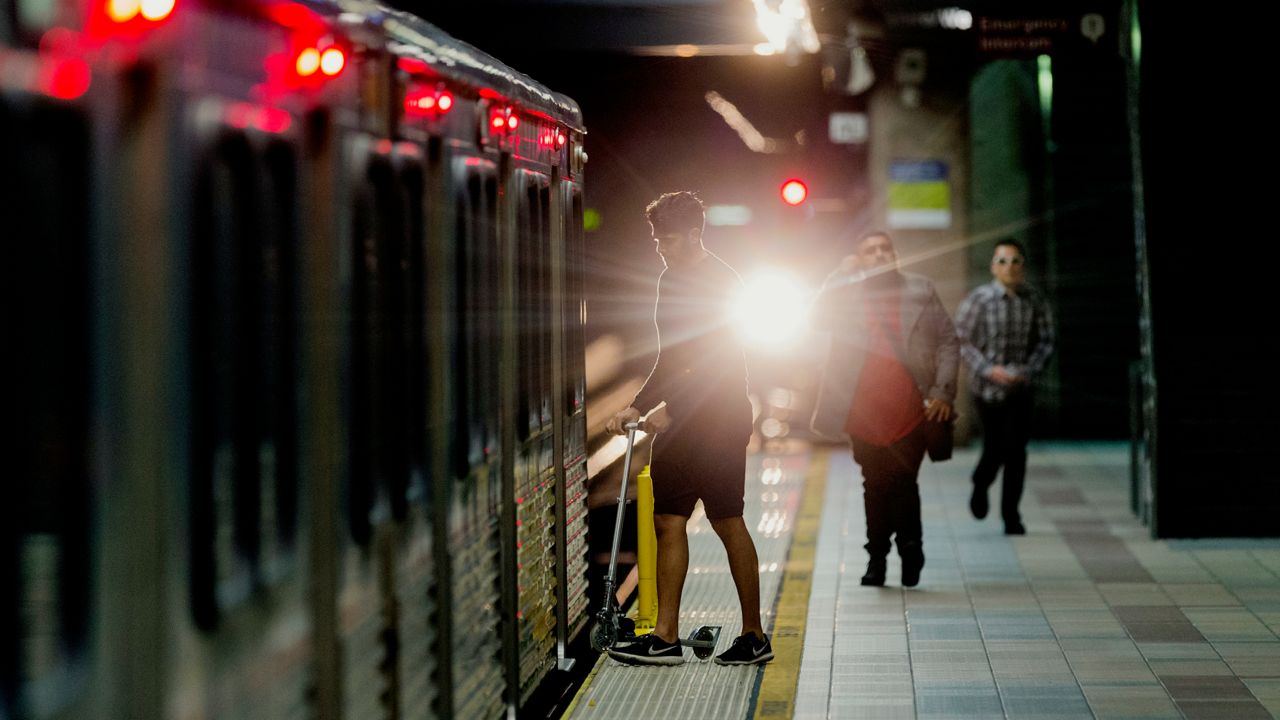LOS ANGELES (CNS) — Students enrolled in the Los Angeles Community College District can take Metro and other participating transit agencies for free under a pilot program that will last through Dec. 31, 2022, the district announced Tuesday.
The GoPass program went into effect Dec. 1 and followed the Los Angeles County Metropolitan Transportation Authority Board of Directors' vote on Sept. 23 to approve free Metro access for students at K-12 and community college school districts that agree to share the program's costs with Metro.
The program with the Los Angeles Unified School District went into effect on Oct. 1 and is set to last through June 30, 2023. Metro CEO Stephanie Wiggins announced the GoPass program for Los Angeles Community College District students on Tuesday alongside students, the district's board President Steve Veres and Chancellor Francisco Rodriguez.
"A recent study completed by the Hope Center found that students spend a fifth of their total living expenses on transportation, and this is especially true for community college students who almost exclusively commute to campus," Metro CEO Stephanie Wiggins said Tuesday.
"It is clear that students with subsidized transportation perform better at school, allowing them to focus on what really matters: their education. We created the GoPass program because we do not want transportation to be one of the barriers students must face in completing their college education."
One-fourth of LACCD students reported using public transit regularly to access classes before the COVID-19, and officials hope the GoPass program will remove cost barriers to public transit for low-income students.
According to LACCD, which recently conducted a survey of its students, 68% of students come from low-income backgrounds, more than 51% live below the poverty line, 55% reported housing insecurity and 63% reported food insecurity. The district hopes the program will mean students have more money to spend on necessities like food instead of transit to get to school.
"It is fitting that transit equity in Los Angeles County takes a big step here today," Veres said. "We have been advocating in support of this issue for over four years. This fareless transit system for all students, particularly for community college students, is transformational for over 50% of our students, who've told us they have difficulty paying for public transport. This effort will undoubtedly bring improved quality of life and peace of mind to many of our student's, allowing them to focus on their academic success."
According to LACCD, its students had advocated for a fareless transit program. The approved program for K-12 and community college districts was estimated to cost about $49.9 million in lost revenue over two years, with 87 of Los Angeles' school districts expressing interest in participating in the program when the Metro Board of Directors voted to approve the pilot. A majority of the pilot program — $41.5 million — is paid by the federal American Rescue Plan.
"For years, students have told us that transportation is a significant burden impacting their ability to attend and access our colleges," LACCD Chancellor Francisco C. Rodriguez said. "Today we can feel proud of the work we've done to bring this effort to communities who stand to benefit the most."
Metro initially explored expanding the program to low-income riders, which is 70% of Metro's riders, but that expansion is contingent on $416 million in new funding. Metro instead voted to develop a plan to double the number of participants in its Low-Income Fare Is Easy (LIFE) Program, which assists low-income LA County residents with subsidized transit access.
Before the pandemic, about 35% of the system's low-income riders were part of the LIFE program, while currently the program includes 60% of Metro's low-income riders.
The program offers discounted transit passes, including $6.50 for a 7-Day pass — a $13 savings — and $26 for a 30-day pass — a $50 savings. Newly enrolled riders also get 90 days of free rides.
Metro officials say the LIFE application process has been streamlined and forms take only a few minutes to complete with basic information on applicants and other household members. People can enroll in the program online here or by visiting:
- the Wilshire/Western Station, 3775 Wilshire Blvd. in Koreatown, from 10 a.m. to 2:30 p.m. Wednesday
- the Pomona Metrolink Station, 100 W. Commercial St. in Pomona, from 8 a.m. to 3:30 p.m. Thursday and from 8 a.m. to 4 p.m. on Dec. 20
- Los Angeles County+University of Southern California Medical Center, 1200 N. State St. in Boyle Heights, from 8 a.m. to noon Dec. 15
- the Downtown Long Beach Station, 130 E. First St. in Long Beach, from 8 a.m. to 3:30 p.m. Dec. 16
People can also apply for the Low-Income Fare Is Easy (LIFE) program online here.



